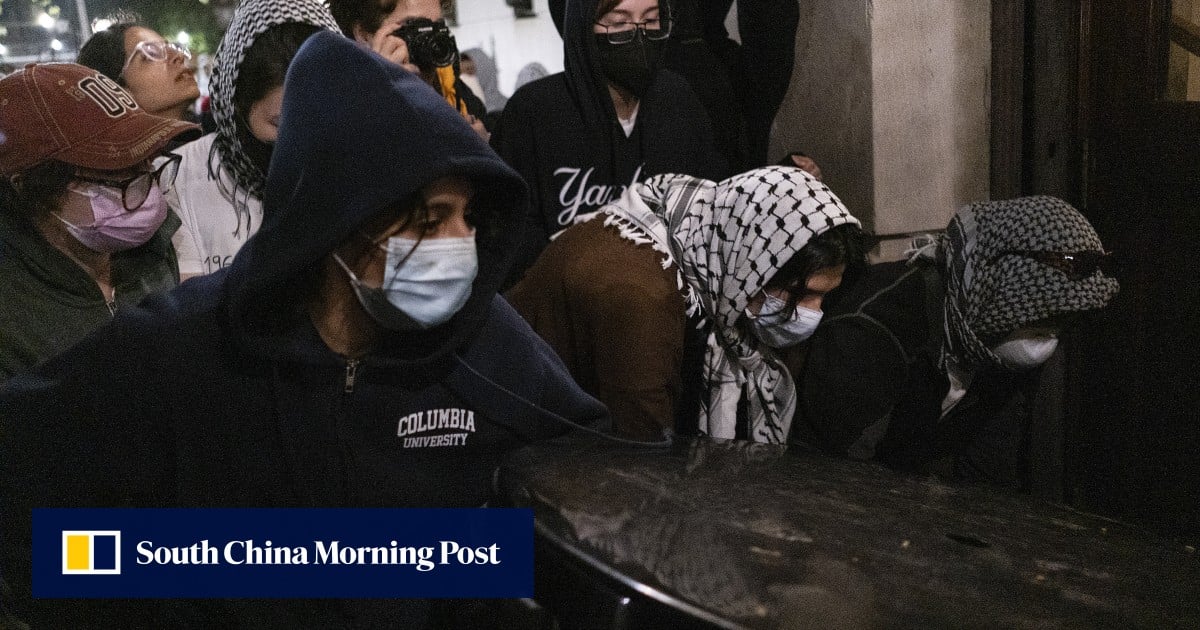The student radio station, WKCR-FM, broadcast a play-by-play of the hall’s takeover – which occurred nearly 12 hours after Monday’s 2pm deadline for the protesters to leave an encampment of around 120 tents or face suspension. Representatives for the university did not immediately respond to emails requesting comment early on Tuesday, but the Public Safety department said in a statement that access to the Morningside campus has been limited to students living in the residential buildings and employees who provide essential services, such as dining, public safety and maintenance staff. There was just one access point into and out of campus.
“The safety of every single member of this community is paramount,” the advisory said.
In the X post, protesters said they planned to remain in the hall until the university conceded to the CUAD’s three demands: divestment, financial transparency and amnesty.
Columbia suspends pro-Palestinian protesters, police make arrests at Texas campus
Columbia suspends pro-Palestinian protesters, police make arrests at Texas campus
Universities across the US are grappling with how to clear out encampments as commencement ceremonies approach, with some continuing negotiations and others turning to force and ultimatums that have resulted in clashes with police. Dozens of people were arrested on Monday during protests at universities in Texas, Utah, Virginia and New Jersey, while Columbia said hours before the takeover of Hamilton Hall that it had started suspending students.
The nationwide campus protests began as a response by some students to Israel’s offensive in Gaza after Hamas launched a deadly attack on southern Israel on October 7.
Militants killed about 1,200 people, most of them civilians, and took roughly 250 hostages. Vowing to stamp out Hamas, Israel has killed more than 34,000 Palestinians in the Gaza Strip, according to the local health ministry.
Israel and its supporters have branded the university protests as antisemitic, while critics of Israel say it uses such allegations to silence opponents. Although some protesters have been caught on camera making antisemitic remarks or violent threats, organisers of the protests, some of whom are Jewish, say it is a peaceful movement aimed at defending Palestinian rights and protesting the war.
At the University of Texas at Austin, a lawyer said at least 40 demonstrators were arrested on Monday. The confrontation was an escalation on the 53,000-student campus in the state’s capital, where more than 50 protesters were arrested last week.
Later Monday, dozens of officers in riot gear at the University of Utah sought to break up an encampment outside the university president’s office that went up in the afternoon. Police dragged students off by their hands and feet, snapping the poles holding up tents and zip-tying those who refused to disperse. Seventeen people were arrested. The university says it’s against code to camp overnight on school property, and that the students were given several warnings to disperse before police were called in.
At Princeton University, 13 people were arrested on Monday night, including 11 students, after briefly occupying a building that houses its graduate school. They received a summons for trespassing and have been barred from campus, President Christopher Eisgruber said in a statement.
The plight of students who have been arrested has become a central part of protests, with the students and a growing number of faculty demanding amnesty for protesters. At issue is whether the suspensions and legal records will follow students through their adult lives.
Pro-Palestinian protests at US universities show no sign of slowing after hundreds arrested
Pro-Palestinian protests at US universities show no sign of slowing after hundreds arrested
The Texas protest and others – including in Canada and Europe – grew out of Columbia’s early demonstrations that have continued. On Monday, student activists defied the 2pm deadline to leave the encampment. Instead, hundreds of protesters remained. A handful of counter-demonstrators waved Israeli flags, and one held a sign reading, “Where are the anti-Hamas chants?”
While the university didn’t call police to roust the demonstrators, school spokesperson Ben Chang said suspensions had started but could provide few details. Protest organisers said they were not aware of any suspensions as of Monday evening.
In a rare case, Northwestern University said it reached an agreement with students and faculty who represent most protesters on its campus near Chicago. It allows peaceful demonstrations through the June 1 end of spring classes and in exchange, requires removal of all tents except one for aid, and restricts the demonstration area to allow only students, faculty and staff unless the university approves otherwise.
At the University of Southern California, organisers of a large encampment sat down with university President Carol Folt for about 90 minutes on Monday. Folt declined to discuss details but said she heard the concerns of protesters and talks would continue on Tuesday.
USC sparked a controversy on April 15 when officials refused to allow the valedictorian, who has publicly supported Palestinians, to make a commencement speech, citing non-specific security concerns for their rare decision. Administrators then scrapped the keynote speech by filmmaker Jon M. Chu, who is an alumnus, and declined to award any honorary degrees.
The backlash, as well as Columbia’s demonstrations, inspired the encampment and protests on campus last week, when 90 people were arrested by police in riot gear. The university has cancelled its main graduation event.
As Gaza protests spread at US universities, House speaker suggests calling in National Guard
As Gaza protests spread at US universities, House speaker suggests calling in National Guard
Administrators elsewhere tried to salvage their commencements, and several have ordered the clearing of encampments in recent days. When those efforts have failed, officials threatened discipline, including suspension, and possible arrest.
But students dug in their heels at other high-profile universities, with stand-offs continuing at Harvard, the University of Pennsylvania, Yale and others. Police in riot gear at Virginia Commonwealth University sought to break up an encampment there late on Monday and clashed with protesters.
